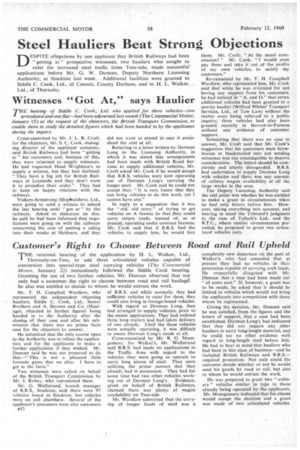Witnesses "Got At," says Haulier
Page 46

If you've noticed an error in this article please click here to report it so we can fix it.
THE hearing of Siddle C. Cook, Ltd. who applied for three vehicles—Iwo articulated and one flat—had been adjourned last month (The Commercial Motor, January 15) at the request of the objectors, the British Transport Commission, to enable them to study the detailed figures which had been handed in by the applicants during the inquiry.
Cross-examined by Mr. J. L. R. Croft, for the objectors, Mr. S. C. Cook, managing director of the applicant company, said British Railways had been "getting at" his' customers and, because of this, they were reluctant to supply witnesses. He had requested Head Wrightson's to supply a witness, but they had declined: " They have a big job for British Railways at Leamside and they don't want it to prejudice their order." They had to keep on happy relations with the railways.
Vickers-Armstrong (Shipbuilders), Ltd., were going to send a witness to attend the last hearing until "got at" by the railways. Asked to elaborate on this, he said he had been informed that negotiations were going on with the railways concerning the cost of putting a siding into their works at Hebburn, and they did not want to attend in case it prejudiced the cost at all.
Referring to a letter written by Dorman Long to the Licensing Authority, in which it was stated that arrangements had been made with British Road Services to supply additional vehicles, Mr. Croft asked Mr. Cook if he would accept that B.R.S. vehicles were now operating out of Dorman Long's carrying the longer steel. Mr. Cook said he could not accept that: "It is very funny that they can bring vehicles to do this work, yet I cannot have any."
In reply to a suggestion that it was the "old, old story" of trying to get vehicles on A licence io that they could carry return loads, instead of, as at present, operating under contract licences, Mr. Cook said that if B.R.S. had the vehicles to supply him, he would hire them. Mr. Croft: "At the usual commission?" Mr. Cook: "1 would even pay them and take it out of the profits of my own vehicles, to satisfy my customers."
Re-examined by Mr. T. H. Campbell Wardlaw, who represented him, Mr. Cook said that while be was criticized for not having any support from his customers, he had noticed in "A. and D." that seven additional vehicles had been granted to a nearby haulier (Wilfred Whites' Transport Services, Ltd., of Tow Law) without the matter even being referred to a public inquiry; three vehicles had also been granted recently in Barrow-in-Furness without any evidence of customer support • Submitting that there was no case to answer, Mr. Croft said that Mr. Cook's suggestion that his customers were browbeaten or blackmailed into not sending witnesses was too contemptible to deserve consideration. The letters should be completely and utterly disregarded. B.R.S. had undertaken to supply Dorman Long with vehicles and there was any amount of railway wagon availability at all the large works in the area.
The Deputy Licensing Authority said the real point was whether he was entitled to make a grant in circumstances when he had only letters before him. However, taking everything into account, and bearing in mind the Tribunal's judgment in the case of Tufnell's Ltd., and the B.T.C., where similar circumstances preL vailed, he proposed to grant two articulated vehicles only.




















































































































